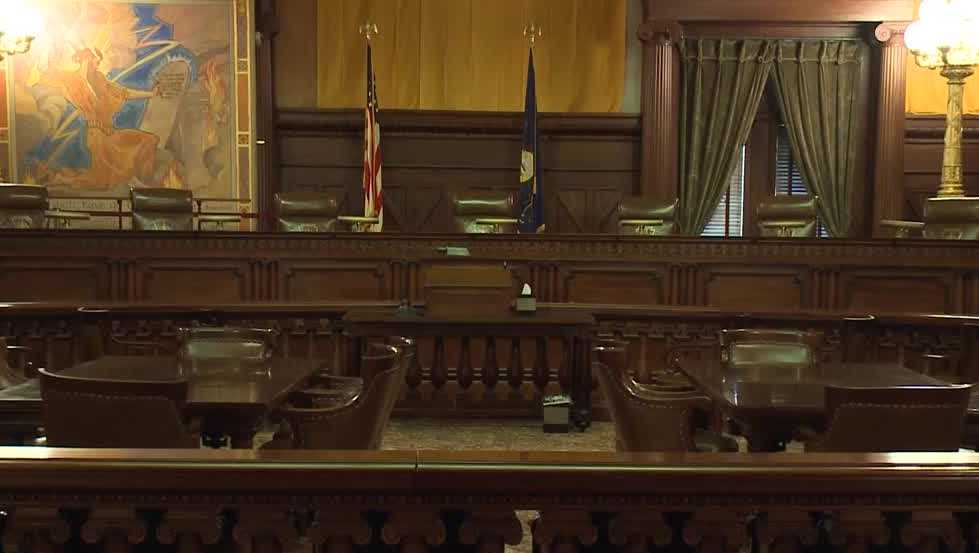On one hand, it’s a simple choice: “Yes or no?”But that decision Pennsylvania voters are being asked to make this fall carries major stakes on whether Supreme Court justices Christine Donohue, Kevin Dougherty, and David Wecht— all Democrats — should be retained in their roles.Retention votes occur every 10 years after a justice’s initial election and continue until an office is vacated or the mandatory retirement age of 75 years old is reached. Because Donohue, Dougherty and Wecht are all on the ballot at the same time, it threatens to shake up the 5-2 Democrat majority on the state’s High Court, which could soon weigh in on issues like elections and mail voting, congressional maps, the legality of skill game machines, and abortion rights and public funding for abortion.”I mean, it really can change the balance of power on the court. So, it’s a unique opportunity to try to change the direction of the court,” said Berwood Yost from Franklin and Marshall College’s Center for Opinion Research.Because the court’s makeup could face a shakeup and the justices’ decisions can impact the lives of every Pennsylvanian, the race has seen millions of dollars’ worth of spending from political groups seeking to influence the race.Republicans have sought to unseat all three justices, urging “no” votes on retaining them.”If you believe that judges should interpret the law, and not make the law, then you should vote no on extending these three justices,” said state Senator and Pennsylvania GOP Chairman Greg Rothman.Rothman and Republicans have criticized the justices, accusing them of overstepping their purview on COVID pandemic restrictions and mail voting.”Unfortunately, we have three Supreme Court justices who are very much activist judges who believe that they should make the laws. If you want to make the laws, you should run for the legislature or run for governor,” he said.Democrats are working to retain these judges, amid an effort to rebound from a disastrous 2024 election season.”The nonpartisan, even right-leaning bar association recommended not just for the Supreme Court justices, but retention for all the appellate court justices,” said Eugene DePasquale, the new chairman of the Pennsylvania Democratic Party.Democrats have pushed for the justices to be retained, saying they are fair and will protect the rights of Pennsylvanians, particularly on issues like access to abortion.”Holding up the law and fair education funding, protecting reproductive freedom by upholding the law and standing up for judicial fairness? That, to me, is what a judge should be doing.”Yost noted the substantial financial investment by political committees and partisan groups in these races, which have traditionally resulted in judges being retained. “Even among people who are likely to vote, they’re not certain what they’re going to do. And so, all the spending over the next weeks is going to make a difference in influencing people and hopefully getting them to pay attention, to understand what’s at stake and what a yes or no vote means,” he said.
On one hand, it’s a simple choice: “Yes or no?”
But that decision Pennsylvania voters are being asked to make this fall carries major stakes on whether Supreme Court justices Christine Donohue, Kevin Dougherty, and David Wecht— all Democrats — should be retained in their roles.
Retention votes occur every 10 years after a justice’s initial election and continue until an office is vacated or the mandatory retirement age of 75 years old is reached. Because Donohue, Dougherty and Wecht are all on the ballot at the same time, it threatens to shake up the 5-2 Democrat majority on the state’s High Court, which could soon weigh in on issues like elections and mail voting, congressional maps, the legality of skill game machines, and abortion rights and public funding for abortion.
“I mean, it really can change the balance of power on the court. So, it’s a unique opportunity to try to change the direction of the court,” said Berwood Yost from Franklin and Marshall College’s Center for Opinion Research.
Because the court’s makeup could face a shakeup and the justices’ decisions can impact the lives of every Pennsylvanian, the race has seen millions of dollars’ worth of spending from political groups seeking to influence the race.
Republicans have sought to unseat all three justices, urging “no” votes on retaining them.
“If you believe that judges should interpret the law, and not make the law, then you should vote no on extending these three justices,” said state Senator and Pennsylvania GOP Chairman Greg Rothman.
Rothman and Republicans have criticized the justices, accusing them of overstepping their purview on COVID pandemic restrictions and mail voting.
“Unfortunately, we have three Supreme Court justices who are very much activist judges who believe that they should make the laws. If you want to make the laws, you should run for the legislature or run for governor,” he said.
Democrats are working to retain these judges, amid an effort to rebound from a disastrous 2024 election season.
“The nonpartisan, even right-leaning bar association recommended not just for the Supreme Court justices, but retention for all the appellate court justices,” said Eugene DePasquale, the new chairman of the Pennsylvania Democratic Party.
Democrats have pushed for the justices to be retained, saying they are fair and will protect the rights of Pennsylvanians, particularly on issues like access to abortion.
“Holding up the law and fair education funding, protecting reproductive freedom by upholding the law and standing up for judicial fairness? That, to me, is what a judge should be doing.”
Yost noted the substantial financial investment by political committees and partisan groups in these races, which have traditionally resulted in judges being retained.
“Even among people who are likely to vote, they’re not certain what they’re going to do. And so, all the spending over the next weeks is going to make a difference in influencing people and hopefully getting them to pay attention, to understand what’s at stake and what a yes or no vote means,” he said.

